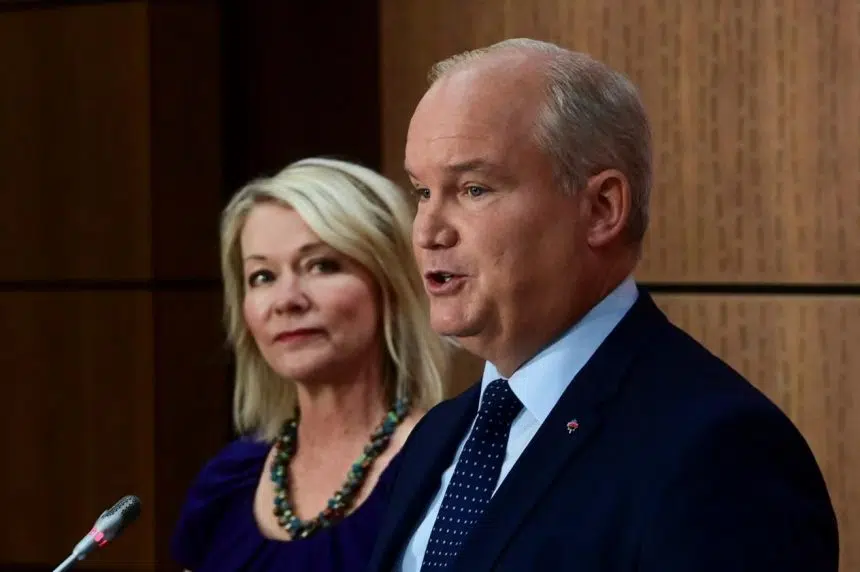OTTAWA – Conservative Leader Erin O’Toole says overcoming western alienation and helping Canada’s post-pandemic economic recoveries are among his top priorities.
A fall election, he said, is not, though the Conservatives will be ready if it comes to that.
O’Toole has been in his post for a little over a week. He named his House of Commons leadership team Wednesday, including bringing on Manitoba MP Candice Bergen as his deputy leader.
He is the first leader of the Conservatives not from Western Canada since the 2003 unite-the-right movement brought the fractured wings of the party back into one. His staff is largely also drawn from eastern provinces.
Five of the eight people he named to the House of Commons team Wednesday are eastern MPs.
O’Toole would not say how worried he is about the rise of Wexit, an Alberta-based party advocating for the four western provinces to secede from Canada. It is led by Jay Hill, a former Conservative MP who was the government house leader for several years under then-Prime Minister Stephen Harper.
When the Reform party grew out of western alienation sentiment in the 1980s, it eventually split the right-wing vote with the Progressive Conservative party. That helped the Liberals win three majority governments in a row.
“I’m reminding everyone that it worked out well for the Liberals,” O’Toole said.
“I will be listening and I think people that are frustrated, I’m saying, ‘Don’t let Justin Trudeau win.’ Make sure we are united. Make sure we win the next election.”
Fear that former Conservative MP Maxime Bernier’s upstart People’s Party of Canada might hurt the Conservative vote in 2019 turned out not to be justified.
But the party’s strength is in Western Canada – almost two-thirds of its current MPs are from the west, and almost half the votes cast for Conservatives in 2019 came from western voters. In Alberta, where Wexit sentiment developed and is strongest, the Conservatives won 70 per cent of the vote. If split votes did put western Conservative seats at risk, the consequences for the Tories could be dire.
Bergen, who was briefly in Harper’s cabinet before 2015 and was the party’s house leader under former leader Andrew Scheer, said western alienation was the very first thing O’Toole raised when he spoke to Prime Minister Justin Trudeau last week.
“Erin and I have talked briefly over the last few hours and one of the things he has asked me to focus on is western alienation,” she said. “And the fact that westerners need to know that Conservatives know this is an issue.”
Trudeau prorogued Parliament last month, intending to return Sept. 23 with a new speech from the throne outlining how the Liberals plan to help Canada’s economy recover from the COVID-19 pandemic. The speech will result in a confidence vote.
O’Toole said the Conservatives will be ready if an election is necessary, but that isn’t what he wants.
“I’m not here for an election,” O’Toole said. “I’m here for the relaunch of our economy post-COVID.”
Missing from O’Toole’s house team is Leona Alleslev, who was deputy leader under Scheer until July, when she resigned to endorse Peter MacKay for the leadership.
Conservative spokeswoman Kelsie Chiasson said traditionally the deputy leader comes from a different region from the leader and O’Toole’s Durham riding and Alleslev’s Aurora-Oak Ridges-Richmond Hill riding are less than 50 kilometres from each other on Toronto’s outskirts.
O’Toole will announce his shadow cabinet next week and Alleslev is expected to be part of it. O’Toole said so will Alain Rayes. He was the party’s Quebec lieutenant under Scheer but was replaced Wednesday by Richard Martel, the only Quebec MP who endorsed O’Toole for the leadership.
In all O’Toole’s house team includes four MPs who endorsed him, two who endorsed MacKay and two who stayed neutral.
Quebec MP Gerard Deltell is the new Tory house leader. Alberta MPs Blake Richards and Tim Uppal will be the chief whip and the caucus-party liaison, respectively. Ontario MPs Karen Vecchio, Alex Ruff and Eric Duncan will, respectively, be deputy house leader, deputy whip, and question period co-ordinator.
Mia Rabson, The Canadian Press







